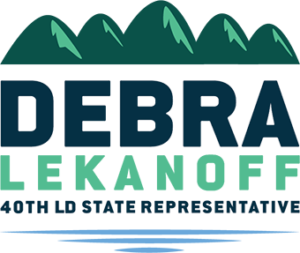Creating Healthy Communities on Fantastic Friday
Dear Friends,
This week, the Northwest Portland Area Indian Health Board (NPAIHB) hosted the National Tribal Opioid at the Tulalip Resort, bringing together experts and officials from around the Pacific Northwest to map out the path forward. The Summit recognized that Washington state, and our nation are facing an opioid and fentanyl crisis and it will take all governing bodies working together to solve it.
It was incredible to hear from so many people who work tirelessly on this issue at every level of our society – from the community organizing level, all the way up to the halls of Congress. Senator Cantwell and Congressman Larsen both spoke to the Summit, sharing federal recommendations to address the crisis across both the state, and the nation.
New data has shown that Washington had the biggest increase in drug overdose deaths of any state in the most recent reporting period, jumping up by 24%. This was by far the worst increase in the nation, and warrants additional, immediate action on the ground here in Washington.
For more information on the new data and increase in overdose deaths, check out this Seattle Times article.

The national opioid epidemic is an incredible threat to public health across the country, and its impacts are deadly to our communities from coast to coast.
Our American Indian and Alaska Native communities have been particularly hard hit, and it is so important that we take strong action to provide the resources necessary to combat this important issue, and to support those who need it most.
I was so grateful to be surrounded this week by so many people dedicated to a single goal – supporting our tribal communities as they address the opioid epidemic. We must always do everything within our power to support both the next seven generations to come, and those who are here right now.
Supporting public health and the health of our communities will always be a priority of mine, and I am so thankful to stand shoulder to shoulder with so many incredible individuals in this work.

According to the NPAIHB website:
“In 2019, NPAIHB completed our ‘Tribal Opioid Response: National Strategic Agenda.’ However, over the past three years, substance use and overdoses have increased significantly; synthetic opioids have become a major threat to the health and well-being of Tribal citizens. In response, NPAIHB Chairman Nickolaus D. Lewis (Lummi Nation) began asking Health and Human Services (HHS), Region 10 to support a Northwest Tribal Opioid Summit. What has become strikingly clear is that a national Tribally-driven opioid summit with Federal, Regional, and State decision-makers is needed to comprehensively address this crisis.
NPAIHB and Tribal leaders recognize the pain and heartbreak of losses in our communities, the anxiety of behavioral health prover shortages and provider burnout, and the lack of culturally specific substance use treatment and recovery programs. The summit program will address the need for increased funding and policy changes to collectively and strategically address this crisis.”
For more information on the summit, click here.
Thank you to Teri Gobin, Chair of the Tulalip Tribes, for hosting this incredible event, and to all the incredible speakers from across the country who came out to discuss this ongoing crisis.
It is because of you and your work that we will be able to beat this crisis of addiction in our communities, and I am ready to take on that difficult work side by side with you all.
Keep an eye out for future updates on this front.
Keep reading for more on this Fantastic Friday.
“Stay Safe, Stay Healthy”
Rep. Debra Lekanoff
Supporting Native Youth
Last weekend, I had the great pleasure of joining Rise Above for their Youth Sports & Wellness clinic in Seattle!
The vent will take place tomorrow at the Redhawk center, and feature incredible speakers like Los Angeles Lakers head coach Darvin Ham, Vin Baker, George Karl, Lenny Wilkens, Dale Ellis, and Detlef Schrempf!

Rise Above is an incredible organization that helps to empower Native youth and set them up for success.
Here is how Rise Above describes themselves on their website:
“At Rise Above, we empower Native youth to lead healthy lives despite the challenges. We deliver education, prevention skills and mentorship through programs tailored to their needs.
Working closely with tribes and partners, we build tailored education programs with basketball clinics at the center. The clinics — free for youth — are the draw and the platform, an invitation for Native youth to hone their skills on and off the court. And research shows us that kids learn better when they engage their bodies along with their brains.
If you’re registering for one of our upcoming clinics, welcome! We can’t wait to meet you!”
To learn more about this incredible organization, click here.
I am thrilled to take part in this incredible event, and I cannot wait to meet the wonderful children who will be in attendance. This organization does such great work to support our Native youth, and I am proud to be a partner of theirs.

Rise Above is focused on keeping youth invested in a healthy life and a healthy future by showing them they can be the success stories.
It was an honor to work side-by-side with legendary family of the Supersonics, as these folks not only gave to our great state, but they continue to give to us a light of hope for generations to come.

This is an incredible opportunity to have our young children look up at those who have come before and truly internalize that they can accomplish incredible things – they just need the support to grow into who they are meant to be.
Saying Goodbye to Tokitae
Last Friday, the Miami Seaquarium announced the death of Tokitae, a 57-year-old Southern Resident orca who had spent the last 53 years of her life in captivity.
Her ashes will return to the Salish Sea and Lummi Nation after the necropsy performed by the University of Georgia is completed. Lummi elder and longtime Tokitae advocate Raynell Morris will transport Tokitae’s ashes back to her homeland.

Lummi Nation Councilmember James Washington stood before the National Opioid Summit and shared the historical trauma our people and animals have experienced, and how they are intertwined in our culture. He shared the story of a baby killer whale, Tokitae who was torn from her home like our Native children, only to be placed in horrific circumstances.
It saddens me that we must say goodbye to Tokitae, and I hope that she finds peace. Fighting for our orca populations is not limited to those that call the Salish Sea home. We must continue working to ensure that even those held in terrible captivity are treated with respect, and, whenever possible, released back to live their lives the way they were meant to.
This weekend there will be a a celebration of life for Tokitae held in the San Juan Islands, and I will be attending to honor the life of this magnificent creature. See below for more information if you are interested as well.

Keep an eye out for more information on Tokitae next week.
32 Hour Work Week for San Juan County
On Tuesday of this week, the San Juan County Council voted unanimously to move most of their employees to a 32-hour work week without lowering their compensation.
The County Council approved the change after negotiating with a labor union that represents 142 nurses, environmental stewards, road-crew workers, park workers, clerks, and other county employees – around 70% of the county’s employees.

Our San Juan Islands have a population of about 18,000, and they’ll become one of the first local governments to move away from the traditional 40-hour work week to support their budget, attract new employees, and give their current employees more personal time.
Sherriff’s Office employees and managers will not be affected by this change.
This is a great win for both the labor union and San Juan County, and I am proud of all who came to the table to negotiate for their willingness and enthusiasm to find solutions that benefit all parties involved.
For more information on this switch, click here.
Major Climate Win in Montana
Those of you who have followed my Fantastic Friday newsletter for a while will recognize a core truth in my work – our efforts today must always keep the next seven generations in mind. It is up to us to leave a world they will be excited to enjoy.
That said, sometimes the younger generation steps up and takes these matters into their own hands, like a recent court case in Montana.
Earlier this month, a Montana state court ruled in favor of young people who argued that the state has violated their right to a “clean and healthful environment,” specifically through the promotion and ongoing use of fossil fuels.

According to the Washington Post:
“The court determined that a provision in the Montana Environmental Policy Act has harmed the state’s environment and the young plaintiffs by preventing Montana from considering the climate impacts of energy projects. The provision is accordingly unconstitutional, the court said.
The ruling — which invalidates the provision blocking climate considerations — also represents a rare victory for climate activists who have tried to use the courts to push back against government policies and industrial activities they say are harming the planet. In this case, it involved 16 young Montanans, ranging in age from 5 to 22, who brought the nation’s first constitutional and first youth-led climate lawsuit to go to trial.”
Read more from the Washington Post here.
This is an incredible step in the right direction, and one that I hope sets a precedent across the country of strong action in favor of our youth, and our planet.
We do not want our children to look back and ask why we did not do more to help protect our home, this planet. I will always hold the health of our environment paramount in my work, and I’m happy to have you with me as we continue this important work for generations to come.
Chelan Ferry Incident
Last weekend, while traveling between Orcas Island and Friday Harbor, the ferry Chelan ran aground.
There were only four passengers on board, and no injuries were reported. Later that night, the ferry returned to Friday Harbor where divers discovered a small hole that was quickly patched.
The incident was described as a “soft grounding,” and the ship likely struck the shoreline.

Unfortunately, the ferry will be out of commission for the foreseeable future as additional repairs and inspections take place. Inter-island service returned to normal service on Tuesday afternoon after the Salish ferry was brought in to fill the gap.
For more information, click here.
Three Largest Ferries Going Electric
While we wait for the Chelan ferry to get back into service, we have good news from Governor Inslee’s office about the future of Washington’s three largest ferries!
Last week, Governor Inslee announced that our three largest ferries will soon run on hybrid-electric power after Washington State Ferries announced they had awarded a shipyard contracts to Vigor for the conversion of WSF’s three Jumbo Mark II-class ferries: the Wenatchee, Tacoma, and Puyallup.

In 2020, Governor Inslee signed an executive order that accelerated the electrification of Washington’s ferry fleet, and the Move Ahead Washington package in 2022 allocated $1 billion for our ferry system, taking an incredible step to modernize and improve a vital piece of our great state’s infrastructure.
As we look to the future, ensuring that our modes of transportation rely on renewable, clean resources is incredibly important. Taking steps like electrifying our three largest ferries sets a standard for future work, and helps make the promise of a greener future a reality.
Forbes 50 Over 50 Impact List
Earlier this month, Forbes released their third annual 50 Over 50 Impact List, and four women making an impact throughout Indian Country were included!
Native News Online did an incredible write-up on the four women, which I would like to share with you below. Read more about them and the list here.

Here is Native News Online’s write-up:
“Meet the four women–already well known to Indian Country–who make the list:
Joy Harjo (72), Artist in Residence, Bob Dylan Center: Joy Harjo (Muscogee Creek Nation) is an internationally renowned performer and writer who became the 23rd Poet Laureate of the United States. She served for three terms from 2019 to 2022. Her project as Poet Laureate, “Living Nations, Living Words,” is a digital mapping of contemporary Native poets about the importance of place and is now in the Library of Congress’ permanent collections. She received The Leadership Award from the Academy of American Poets, a Lifetime Achievement Award from the National Book Critics Circle in 2022 and Yale’s 2023 Bollingen Prize for American Poetry. In 2022 she released a book of prose, a collection of poetry and a new children’s book. She also helped write “We Are America,” an experimental American anthem sampling sounds from across the country. Harjo has built her career on poetry but has made a living through other creative means, including writing screenplays, teaching in academic institutions, playing saxophone, performing and speaking.
Stephine Poston (55), Co-founder of Native Women Lead: Stephine Poston is one of the co-founders of Native Women Lead, an organization she helped establish to invest in and provide loans to Native women founding and running businesses. She is also the founder of Poston & Associates, a full-service communications firm specializing in serving the Native American population. Under Poston’s guidance, Native Women Lead has piloted three lending programs since 2020 to help Indigenous businesses in New Mexico, Arizona, Colorado, and Utah. She launched the Matriarch Restoration Fund in March 2022, which offers $10,000 to $50,000 loans at 3 percent interest rates to Native women artists, makers, crafters, and creatives in the Indigenous communities.
Cynthia Chavez Lamar (51), Director of the National Museum of the American Indian, Smithsonian Institution: Cynthia Chavez Lamar (San Felipe Pueblo) took office as the director of the National Museum of the American Indian (NMAI). She is the first Native American woman to lead a Smithsonian Institution museum. She oversees an institution with more than 1 million objects and photographs and over 500,000 films, digital images, and other media documenting Native Nations and tribes’ cultures and experiences. Chavez Lamar grew up in Katishtya, the Pueblo of San Felipe (her tribe’s reservation), and earned a doctorate in American studies from the University of New Mexico. Chavez Lamar’s career is coming full circle. The first job she took after earning her doctorate was an internship at NMAI, contributing research towards the museum’s expansion. Under her leadership, the NMAI dedicated the National Native American Veterans Memorial in 2022. It was a $15 million project and the first large public celebration the NMAI held since March 2020.
Ramona Bennett (84), Activist: Romona Bennett (Puyallup Tribe) is a longtime leader from the Puyallup Tribe from western Washington state and a pioneering civil rights leader who has dedicated much of her life to advocating for the rights of indigenous people in the U.S. Throughout her life, she’s fought for social and healthcare services and tribal fishing rights. Her work has been peppered with threats to her safety and she has survived multiple assassination attempts during the Fish Wars protests of the 1960s and 1970s. In 1978, Bennett’s advocacy and testimony in legislative hearings helped pass the Indian Child Welfare Act. She was Puyallup tribal chairwoman from 1971 to 1978 but was denied entry to the national tribal chairwoman’s committee for being a woman. She held her ground and insisted on being present. In 2022, she began campaigning to amend a law that she believes undermines the fishing rights of tribes in the Pacific Northeast.”
Congratulations these four incredible women who haves inspired so many, and done such incredible work!
Maui Needs Our Support
As many of you have seen, recent wildfires have devastated Maui, burning thousands of acres and completely destroying the historic town of Lahaina.
The wildfires began on August 8, with the blazes largely, but not entirely, contained as of the writing of this newsletter. According to CBS News:
“Preliminary numbers released on Aug. 12 showed at least 2,200 buildings – about 86% of which are residential – were destroyed or damaged in the Lahaina fire, according to the University of Hawaii’s Pacific Disaster Center.
The cost to rebuild was estimated to be $5.52 billion.”
For more information, click here.
These wildfires are heartbreaking and devastating, and I want to send my love and support to those who are on the ground doing the hard work of rebuilding after a disaster like this.
CBS News has also pulled together an incredible list of organizations we can support as they rebuild and uplift those whose lives have been so devastated by these wildfires. I do hope you will consider donating to help the ongoing efforts.
Find the organizations here.



